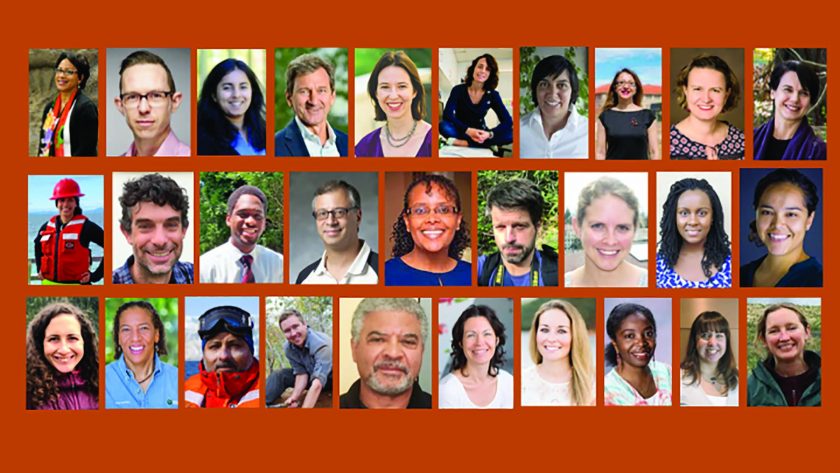Expanding Learning: A Virtual DeFord Series Focuses on Diversity
November 1, 2021

During the past academic year, the Jackson School of Geosciences’ DeFord Lecture Series brought new research to a broader community through two major changes: thoughtful coordination by faculty members to diversify the speakers and topics, and technology that delivered content to more people.
The DeFord Lectures are the signature seminar series at the Jackson School’s Department of Geological Sciences, taking center stage in the department most Thursday afternoons. Although talks now highlight cutting- edge research by geoscientists who traverse the globe, the forum started about 80 years ago as a way for graduate students to present their work. The series is funded by a series of endowments, and this year, the talks were bookended by two prominent scientists: Lisa White, the assistant director of the University of California Museum of Paleontology, who spoke about linking social justice to exhibits; and Dawn Wright, chief scientist at Environmental Systems Research Institute (ESRI), who spoke about mapping and modeling the seafloor.
For the past five years, associate professor Elizabeth Catlos has organized the list of speakers.
“I am more of a coordinator,” said Catlos. “The list of each year’s potential lecturers is really a grassroot effort involving proposals from all faculty.”
Coordinator or leader, the DeFord series under Catlos has become a showcase of diversity in research, ideas, and the geoscientists themselves. During the past few years, nearly half of the lectures have been by female researchers.
Much of this evolution was enabled after discussions with Samuel Moore, the school’s former director of outreach and diversity; and Sharon Mosher, former dean of the Jackson School, who worked with Catlos and others to find speakers within the restrictions of the endowments that fund the series. Charles Kerans, former department head, also played a role in the oversight for the endowment of the lecture series.
And during 2020-21, as White’s and Wright’s lectures attest, the focus shifted to increasing the racial diversity of speakers.
“Diversifying the series has been a departmental effort, and this year’s cohort is the most diverse I have seen,” said Catlos. “The last year was our most diverse speaker series since I have been part of the DeFord.’”
In addition to the diversity of speakers, the research presented last year also represented a diversity of approaches and fields. For example, several talks tackled climate change, with different researchers presenting different angles. This includes extreme events by ETH Zurich’s Sonia Seneviratne, carbon capture by BP’s Chris Walker, global energy poverty by the Bureau of Economic Geology’s Scott Tinker, and soils as carbon sinks by University of California, Merced’s Asmeret Asefaw Berhe. There were also a number of talks on hydrology, including presentations on the Eel River watershed by Tulane University’s Nicole Gasparini and nutrients in coastal freshwater by West Virginia University’s Deon Knights.
The second major change to come to the 2020-21 DeFord Lecture Series: all were presented virtually, over Zoom. The COVID-19 pandemic forced a shift on campus to online education, which in turn opened the seminars to people who typically could not sit in a lecture hall on campus at 4 p.m. CT each Thursday. And for those who could not tune in from afar, recordings are archived on the Jackson School’s YouTube channel, where many presentations have had hundreds of views.
Back to the Newsletter